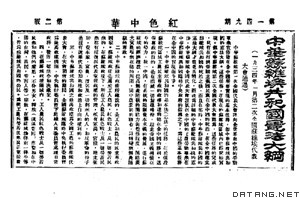1) Chinese Soviet


中国苏维埃
1.
The Social Community Construction of Chinese Soviet——A Lesson That Can Be Drawn by Modern China to Build A Well - to - do Society;
中国苏维埃社会社区建设——当代中国全面建设小康社会的一页历史借鉴
2) China's Soviet campaign


中国苏维埃运动
1.
As a stage of the Chinese revolution, China's Soviet campaign led by the CPC not only learn from the revolutionary culture in the past, but also left a deep mark on contemporary China's socialist system, the ideological, as well as the mobilization paradigm.
文章从中国苏维埃运动独特的革命路径(主要与苏俄革命相比较)着手,对其中的动员模式的形成、发展以及重构的过程给予了“深描”。
3) Chinese Soviet Republic


中华苏维埃共和国
1.
A Review of the Legislation on the Protection of Human Rights in Chinese Soviet Republic;


中华苏维埃共和国人权保障立法评析
2.
Again on the Historical Inevitability of the founding of Chinese Soviet Republic;


再析中华苏维埃共和国成立的历史必然性
3.
The Development of Womens Rights in Chinese Soviet Republic and the Progress of Society in the 20th Century;
中华苏维埃共和国妇女人权的发展与20世纪的社会进步
4) the Chinese Soviet Republic


中华苏维埃共和国
1.
The Communist International and the Founding of the Chinese Soviet Republic;


共产国际与中华苏维埃共和国政权建设
2.
The Influence of 《the Chinese Soviet Republic s Marital Law》 on Marriage Family System in China;
中华苏维埃共和国婚姻法对我国婚姻家庭制度的影响
3.
Comrade Mao Zedong once made highly appraisal to the Chinese Soviet Republic s jail work,the Chinese Soviet Republic s jail work and procedure created in the practice has important influence to the foundation of new Chinese jail work,including production and formation of Mao Zedong s criminal transformation theory.
毛泽东同志曾经对中华苏维埃共和国的监狱工作作出高度评价,中华苏维埃共和国监狱工作在实践过程中所创造的做法和经验对新中国监狱工作的创建、对毛泽东教育改造罪犯理论的产生和形成都具有重要的影响。
5) Soviet Republic of China


中华苏维埃共和国
1.
A Review of Research on Soviet Republic of China at Home;


20世纪90年代中期以来国内中华苏维埃共和国研究述评
2.
The practice of jurisdiction in Soviet Republic of China principally includes four aspects.
研究中华苏维埃共和国审判工作,主要围绕四个方面展开:第一,审判机构的设置情况;第二,审判机构判案的主要制度;第三,审判机构开展工作的程序;第四,对审判工作做总体评价。
6) the Republic of Chinese Soviet


中华苏维埃共和国
1.
The Practice of the Republic of Chinese Soviet at Ensuring the Citizen s Right of Receiving an Education from the Perspective of Educational Funds Supply;
中华苏维埃共和国保障公民受教育权的实践——以教育经费的供给为视角
补充资料:《中华苏维埃共和国宪法大纲》
| 《中华苏维埃共和国宪法大纲》 中国第二次国内 革 命战 争时期工农民主政权的根本法,1931 年 11 月在江西瑞金由第一次全国苏维埃代表大会通过,1934年1月由第二次全国苏维埃代表大会修改,共 17条。其基本内容为:确定政权的性质是工农民主专政,“这个专政的目的,是在消灭一切封建残余,赶走帝国主义列强在华的势力,统一中国,有系统地限制资本主义的发展,进行苏维埃的经济建设,提高无产阶级的团结力与觉悟程度,团结广大贫农群众在他的周围,同中农巩固的联合,以转变到无产阶级的专政”;规定国家的组织形式是民主集中制的工农兵代表会议制,全国工农兵代表大会为中华苏维埃共和国的最高政权机关,在大会闭会期间,全国苏维埃中央委员会为最高政权机关,中央委员会下设组织人民委员会,处理日常政务 , 发布一切法令和议决案 ; 规定工农劳动群众享有言论、出版、集会、结社等政治民主权利,并用政权的力量“保障他们取得这些自由的物质基础”。宪法大纲还规定了体现工农民主政权彻底反对帝国主义与封建势力,坚决保护工农劳动群众的政治经济利益,坚决保护少数民族和国际革命友人利益的劳动政策、土地政策、财经政策、对外政策、军事政策、婚姻政策、文教政策、宗教政策、民族政策等。宪法大纲是中国第一部反映劳动人民当家作主、参加国家管理的宪法性文件,为后来建立革命政权和法制建设提供了经验。
|
说明:补充资料仅用于学习参考,请勿用于其它任何用途。
参考词条
